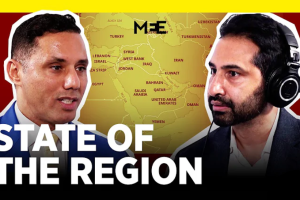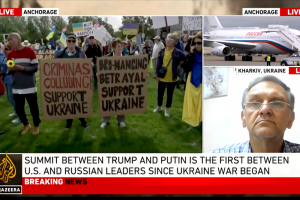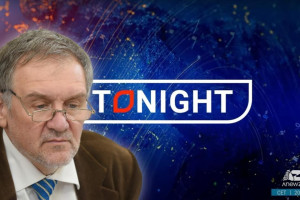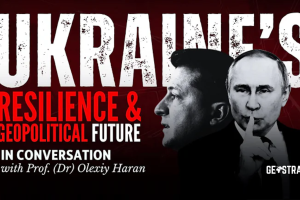Ukraine at 25: Leaders in Ukraine share their thoughts

Ukraine’s economy is still on shaky ground as the International Monetary Fund has withheld funds because the country’s leadership has failed to implement certain corruption-fighting measures. Ukraine’s sovereignty is also fragile as Russia continues to wage war in Ukraine’s east for a third consecutive year. As a result, Ukraine’s territorial area has shrunk by about 7 percent, nearly 10,000 people have lost their lives and some 2.2 million have been displaced, of whom 1.8 million are internally displaced persons (IDPs).
Following are their edited comments on the status of Ukraine at 25.
Ulana Suprun, Ukraine’s acting minister of health:
Independence Day is a time for self-reflection and self-determination. It is a time to remember who we are and for what we are fighting.
We need to reflect upon our history, the way that our country became independent, and respect the ideals of our ancestors that they lived by – and fought for. Most importantly today, we need to respect our brave men and women who defend our country from Russian invasion and liberate the occupied territories.
Ukraine is now standing at the intersection of two worlds and must choose whether to remain in the past, with no respect for the rights and dignity of its citizens, or to become an independent state based on democratic values.
Enlightenment through medicine, education, and science will lead Ukraine to a brighter and more prosperous future. We are grateful to our partners around the world who support Ukraine’s will to become a successful, democratic, and European country.

Chrystyna Lapychak/The Ukrainian Weekly
August 24, 1991: The scene outside the Verkhovna Rada as members of the Ukrainian Parliament met in a special session on the day Ukraine’s independence was proclaimed. (The view is from a window inside the Rada building.)
Hanna Hopko, national deputy of the Verkhovna Rada, head of the Rada’s Committee on Foreign Affairs:
As one of the largest European countries with more than 1,000 years of ancient history and culture, these 25 years of independence have been very challenging.
Ukrainians currently are making new history in Europe. We are obliged to succeed, since our success could become a model for transformation in the whole post-Soviet space.
As a participant in the Orange and Euro-Maidan revolutions, now I know that it was much easier to fight against the former regime of Viktor Yanukovych. It’s much longer and harder to transform a country and society after 70 years of Communist pressure than two decades of post-Soviet, kleptocratic and oligarchic type governance.
The ongoing struggle among Ukraine’s elites complicates the already difficult task of reform as Ukraine tries to gain full independence from Russia in the energy, military, information, and economic sectors.
As a member of Parliament, together with my colleagues from civil society, we initiated and adopted important anti-corruption legislation. We also embarked on de-communization, deregulation and judiciary reform. The database of real estate owners became open, the law on public broadcasting was adopted, and Russian propaganda was prohibited in Ukraine.
This and the next few years will be a defining moment in our existential fight to build a modern country with strong army, rule of law, favorable investment climate, transparency, and finally win over Russian economic and military aggression.

Chrystyna Lapychak/The Ukrainian Weekly
August 24, 1991: The scene on Kyiv’s October Revolution Square – later renamed Independence Square – as the public celebrates Ukraine’s newly re-established independence.
Daria Kaleniuk, executive director of the Anti-Corruption Action Center:
Why are there no changes after the Revolution of Dignity? Why are politicians still lying and oligarchs still buying politicians? Why are prosecutors still selling their cases and judges driving Bentleys and living in luxurious houses… And the people are still poor?
I often hear such assertions.
Yet Ukraine has never before been such an open society as it is today. There are so many accessible state registries and available information about public finances that Ukraine has turned into a Mecca for investigative journalists.
Never again will it be easy to hide stolen assets. Many caught stealing suffer the consequences, and many resign – for the first time in 25 years.
After two years in the making, we have an independent law enforcement agency in the National Anti-Corruption Bureau that is cracking down on grand political corruption.
Civil society never before has had such an influence on politics, policies and politicians. Dozens of laws – not very much accepted by the political leadership – were adopted. And many in civil society have entered politics to change the system from the inside.
What Ukraine still lacks to ensure irreversible changes is a political elite that is ready to sacrifice for the benefit of everyone.
The reason is simple: for 80 years the true elite was intimidated, deported, murdered, or oppressed.
Many emigrated.
My generation doesn’t have mentors from whom to learn. We are learning from our own mistakes. A new generation of political leaders in Ukraine needs time to mature. However, 25 years is enough to understand what we want to build, how we shouldn’t act and that everything is possible now as never before.
Everything now is in our hands.
“Do the little things, and they will become great,” Ukrainian bard Taras Shevchenko said.

Chrystyna Lapychak/The Ukrainian Weekly
August 24, 1991: After the overwhelming vote for Ukraine’s independence, national deputies drape a Ukrainian flag on the Verkhovna Rada chairman’s podium. The statue of Lenin that looms over the proceedings would soon be gone.
Andriy Biletsky, national deputy of the Verkhovna Rada, the first commander of the Azov Battalion, a former political prisoner:
Over the 25 years of Ukraine’s independence, patriots and statesmen have tried to build a state. To drub the idea out of people’s heads that we’re a piece of the USSR. But among the human virtues that have crowned our nation, unfortunately it was vileness that was placed in the halls of power. To this day in Ukraine, a battle is being waged between two parties: national parties and “little Russian” parties. At this time of war, of patriotic enthusiasm and heroism, there is continued infighting among Ukrainians. I hope that a quarter of a century was enough time to end fighting amongst each other.
I am certain that the civilian and military volunteers represent an image of the new Ukraine. These are people whom corruption and the machinations of fate cannot break. A new generation has been born before our eyes, or better yet, has been reborn – the generation of the unvanquished. Thus, today it is my goal to give them everything to enable the true rebirth of this nation.
On the 25th anniversary of our independence, I shall meet with my frontline brothers and remember those who are no longer with us. For the rest of our life now we must stand for Ukraine and defend her on the front, in politics and in civil society because the sacrifices of the fallen soldiers cannot be betrayed. Glory to Ukraine!

Chrystyna Lapychak/The Ukrainian Weekly
August 24, 1991: The scene inside the Verkhovna Rada after the vote for Ukraine’s independence. Members of the democratic bloc carry in a huge Ukrainian flag, which had been draped over one of the tanks protecting the Russian Parliament building at the time of the attempted coup in the Soviet Union.
Olexiy Haran, professor at Kyiv Mohyla Academy and academic director at the Democratic Initiatives Foundation:
Ukraine stands in contrast to many other former Soviet republics in that it gained its independence peacefully and without interethnic conflict. Ukraine’s 1996 Constitution was the result of a compromise between the president and the Parliament, as opposed to then Russian President Boris Yeltsin’s “revolutionary” approach, which involved an armed assault on the Russian Parliament.
Compromise was also a necessity. Ukraine, in contrast to its post-Communist western neighbors, faced enormous challenges after independence. It had to build a nation-state, civil society, democracy and free market simultaneously. None of this could be achieved overnight, and it demanded compromises with the country’s post-Communist nomenclature. The drawback to Ukraine’s system of power-sharing and political compromise was that it preserved the influence of the Communist past, which, compared to Poland, Hungary and the Baltic countries, was not radically restricted.
Another difference in Ukraine’s political culture, compared to Russia’s, is a stronger tradition of individualism, private ownership of land, and the absence of broad public support for an authoritarian leader.
The flip side of all these compromises (especially when they are not open to the public) is that they cause gridlock and paralysis and postpone radical reforms. All of this makes the road to achieving European Union standards longer and more winding.








